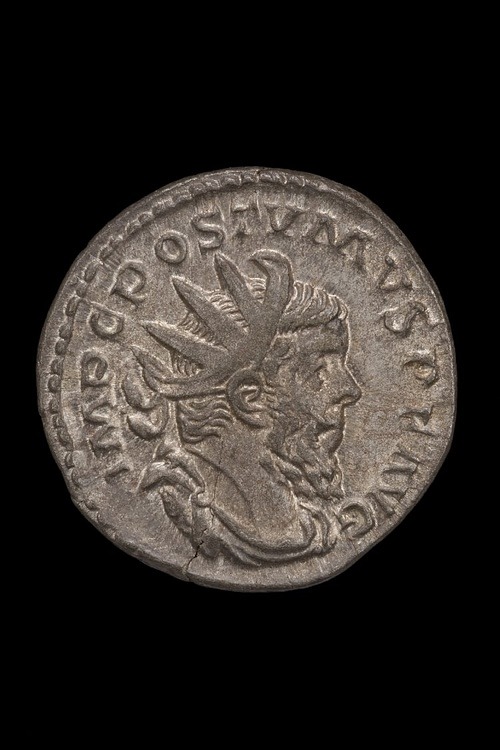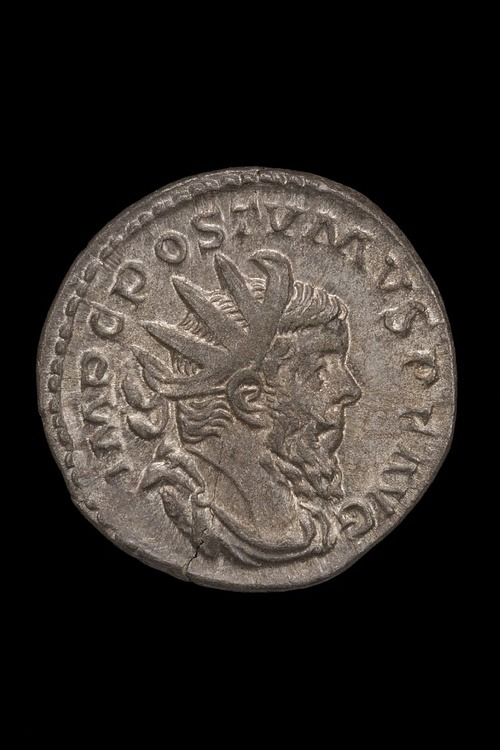#269CE
Photo

Postumus
Postumus was Roman emperor from 260 to 269 CE. Marcus Cassianus Latinius Postumus was a trusted military commander of Emperor Gallienus (253-268 CE) and governor or Germania Superior and Inferior (Upper and Lower Germany). After the death of his father Valerian in 260 CE, Gallienus left him in charge of military operations in the west. It was a mistake the inexperienced and trustworthy emperor would soon regret, for the commander's own troops would take advantage of Gallienus's absence to declare Postumus emperor. It was a move that allowed him to establish himself as the ruler of the Gallic Empire, which included Gaul, Spain, and eventually Britain.
Rise to Power
Marcus Cassianus Latinius Postumus was an opportunist. While fighting the Persian King Shapur in the east, Emperor Valerian has been captured while attempting to negotiate peace and eventually died while in captivity, even suffering the humiliation as serving as the king's footstool. His unexpected death led to a crisis in the empire, for many inside and outside of Rome did not believe his co-emperor and son Gallienus was capable of managing the vast empire. Although he struggled to maintain his right to the throne and restore order, there was resistance.
From 235 to 285 CE, there were at least fifty claimants to the throne, and only one would die of natural causes, Claudius Gothicus. The Pax Romana, initiated by Augustus, was long over. In 260 CE Postumus would not be the only one to oppose the recognized emperor. Much of the resistance to Gallienus was in the east. For the next two years, there were at least seven pretenders to the purple. First, like so often before, after a successful victory, a commander would be declared emperor by his own troops. This time is was Ingenuus. Unfortunately, he would neither be recognized in Rome nor even step foot in the city; he was defeated by the Roman commander Aureolus at Mursa. While some speculate he was killed by his devoted troops as he fled the battle scene, others believe he committed suicide to avoid capture.
Ingenuus' once dedicated army quickly switched their allegiance to Regalianus, the governor of Upper Pannonia. Again, this supposed reign was short-lived. He was overcome by Gallienus, and like so many others, allegedly killed by those who had initially supported him. With the urging of their father, two more emerged to claim the throne, the brothers Macrianus and Quietus. In 261 CE Macrianus and his army advanced into the Balkans only to meet Roman forces and be severely defeated. Quietus, who had remained in Syria, was routed at Emesa where the townspeople turned on him and put the would-be emperor to death.
Continue reading...
44 notes
·
View notes
Photo

Postumus
Postumus was Roman emperor from 260 to 269 CE. Marcus Cassianus Latinius Postumus was a trusted military commander of Emperor Gallienus (253-268 CE) and governor or Germania Superior and Inferior (Upper and Lower Germany). After the death of his father Valerian in 260 CE, Gallienus left him in charge of military operations in the west. It was a mistake the inexperienced and trustworthy emperor would soon regret, for the commander's own troops would take advantage of Gallienus's absence to declare Postumus emperor. It was a move that allowed him to establish himself as the ruler of the Gallic Empire, which included Gaul, Spain, and eventually Britain.
Rise to Power
Marcus Cassianus Latinius Postumus was an opportunist. While fighting the Persian King Shapur in the east, Emperor Valerian has been captured while attempting to negotiate peace and eventually died while in captivity, even suffering the humiliation as serving as the king's footstool. His unexpected death led to a crisis in the empire, for many inside and outside of Rome did not believe his co-emperor and son Gallienus was capable of managing the vast empire. Although he struggled to maintain his right to the throne and restore order, there was resistance.
From 235 to 285 CE, there were at least fifty claimants to the throne, and only one would die of natural causes, Claudius Gothicus. The Pax Romana, initiated by Augustus, was long over. In 260 CE Postumus would not be the only one to oppose the recognized emperor. Much of the resistance to Gallienus was in the east. For the next two years, there were at least seven pretenders to the purple. First, like so often before, after a successful victory, a commander would be declared emperor by his own troops. This time is was Ingenuus. Unfortunately, he would neither be recognized in Rome nor even step foot in the city; he was defeated by the Roman commander Aureolus at Mursa. While some speculate he was killed by his devoted troops as he fled the battle scene, others believe he committed suicide to avoid capture.
Ingenuus' once dedicated army quickly switched their allegiance to Regalianus, the governor of Upper Pannonia. Again, this supposed reign was short-lived. He was overcome by Gallienus, and like so many others, allegedly killed by those who had initially supported him. With the urging of their father, two more emerged to claim the throne, the brothers Macrianus and Quietus. In 261 CE Macrianus and his army advanced into the Balkans only to meet Roman forces and be severely defeated. Quietus, who had remained in Syria, was routed at Emesa where the townspeople turned on him and put the would-be emperor to death.
Continue reading...
27 notes
·
View notes